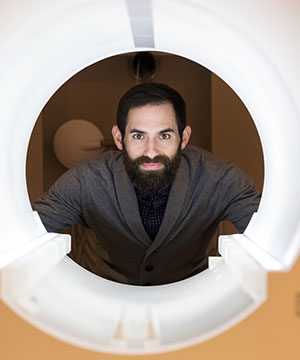
David Dodell-Feder
Associate Professor of Psychology and Neuroscience
PhD, Harvard University, June 2017
- Office Location
- 453 Meliora Hall
- Web Address
- Website
Office Hours: N/A
Research Overview
Professor Dodell-Feder will be reviewing applications for the Master of Science (MS) in psychological science for the March 2026 application cycle.
Professor Dodell-Feder will not be accepting applications for graduate students for the 2026-2027 academic year.
The primary goal of Professor Dodell-Feder's research program is understanding the processes that contribute to healthy and disordered social functioning, and their improvement, with a particular focus on psychotic spectrum disorders. Professor Dodell-Feder utilizes a multimodal and multidisciplinary approach, including neuroimaging (e.g., task-based and resting-state fMRI) and behavioral methods (e.g., experience-sampling), as well as insights from cognitive, social, and relationship psychology, to address the following overarching questions:
- What processes contribute to how we function in the social world?
- In the case of disorders characterized by marked and persistent social difficulties, such as schizophrenia, what are the underlying pathophysiological mechanisms, and how do they contribute to illness risk, onset, and exacerbation?
- How do we prevent and intervene on social difficulties and improve social functioning for clinical and non-clinical populations alike?
- How do we best assess social cognition, social behavior, and intervention-related change in these areas?
Research Interests
- Social cognition and social functioning in psychopathology
Recent Publications (* denotes student/advisee)
- Dodell-Feder, D., Tully, L. M., * Dudek, E., & Hooker, C.I. (2021). The representation of mental state information in schizophrenia and first-degree relatives: a multivariate pattern analysis of fMRI data. Social cognitive and affective neuroscience. 16(6), 608-620.
- Anderson, A. J., McDermott, K., Rooks, B., Heffner, K., Dodell-Feder, D., & Lin, F. (2020). Decoding individual identity from brain activity elicited in imaging common experiences. Nature Communications.
- *Shovestul, B., *Han, J., Germaine, L., & Dodell-Feder, D. (2020). Risk factors for loneliness: The high relative importance of age versus other factors. PLOS ONE, 15(2), e0229087.
- Dodell-Feder, D., *Shovestul, B., * Woodyatt, J., *Popov, V., Germine, L. (2020). Social anhedonia, social networks, and psychotic-like experiences: A test of social deafferentation. Psychiatry Research,284, 112682.
- Dodell-Feder, D., Ressler, K.J., & Germine, L. (2020). Social cognition or social class and culture? On the interpretation of differences in social cognitive performance. Psychological Medicine, 50(1),133-145.
- Dodell-Feder, D., *Saxena, A., Rutter, L., & Germine, L. T. (2019). The network structure of schizotypal personality traits in a population based sample. Schizophrenia Research, 208, 258-267.
- Dodell-Feder, D., & Tamir, D. (2018). Fiction reading has a small positive impact on social cognition: A meta-analysis. Journal of Experimental Psychology: General, 147(11), 1713-1727.
Selected Current Projects
- Using real-time fMRI to train volitional control of the theory of mind network in schizophrenia
- Evaluating social affective forecasting deficits in schizophrenia
- Understanding the impact of social risk factors for psychotic-like experiences
- Evaluating the causal impact of social defeat on psychotic-like experiences and social cognitive bias
- Evaluating the causal impact of fiction reading on social cognition in adults and adolescents
